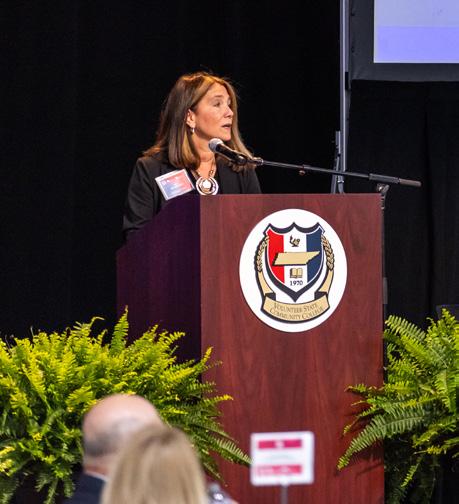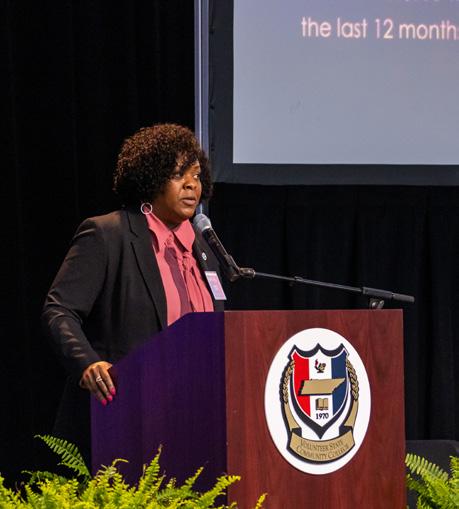




WORKFORCE CONVENING
FINDINGS CALL TO ACTION & RECOMMENDATIONS
SUMMARY BY INDUSTRY
ADVANCED MANUFACTURING & AGRICULTURE BUSINESS & HEALTHCARE
INFORMATION TECHNOLOGY & LOGISTICS CONCLUSION
Tennessee’s first statewide workforce convening was hosted by the Tennessee Board of Regents (TBR), the Tennessee Department of Economic and Community Development (TNDEC), and the Tennessee Department of Labor and Workforce Development (TDOLWD).
Gov. Bill Lee envisions creating stronger connections between higher education and workforce development in the state, driving economic prosperity for all Tennesseans. The governor and the General Assembly have made historic investments in higher education and workforce development over the past several years, including the Governor’s Investment in Vocational Education, expansions to the Dual Enrollment Grant, funding for apprenticeship, and the most significant investment in technical education in the state’s history to fully fund the technical college master plan.
The workforce convening allowed state leaders, including all community and technical college presidents, to reflect with business leaders from Memphis to Mountain City on the remarkable progress in workforce development and opportunities for future collaboration.
The event created space for business leaders from the state’s largest industries to provide direct feedback to higher education and workforce leaders on various workforce development issues. Business leaders shared promising practices, highlighted innovative partnerships, and identified challenges with upskilling and reskilling, recruiting, and retaining talent in Tennessee.
The feedback from the business community will inform new statewide strategies for collaboration between the three host agencies as they seek to remove silos and continue to build an education and workforce ecosystem that works for all Tennesseans.






























BUSINESS LEADERS ARE CONCERNED ABOUT THE LABOR PARTICIPATION RATE AND THE NUMBER OF AVAILABLE JOBS ACROSS ALL INDUSTRIES.
Business leaders are eager to explore and invest in new partnerships that provide training opportunities that innovate around place, space, and time.
BUSINESS LEADERS VALUE THEIR STRONG PARTNERSHIPS WITH TENNESSEE’S COMMUNITY AND TECHNICAL COLLEGES.
Business leaders appreciate the responsiveness of college leaders in meeting their needs through workforce training. However, across all industries, there is a level of specialization within occupations that presents unique opportunities for new forms of training, such as apprenticeship. Apprenticeship provides the perfect vehicle for Tennesseans to work and learn simultaneously and upskill or reskill into highly specialized skills driven by technological advances.
BUSINESS LEADERS ARE INTERESTED IN HOW SHORT-TERM WORKFORCE TRAINING CAN HELP THEIR CURRENT WORKFORCE SPECIALIZE
Business leaders are particularly interested in stackable credentials. Examples include a practical nurse earning certification in chemotherapy patient care or an IT professional earning Amazon’s AWS Cloud Practitioner certification.
BUSINESS LEADERS BELIEVE IN THE VALUE OF EARLY EXPOSURE TO CAREERS, AND THAT DUAL ENROLLMENT IS THE PERFECT AVENUE FOR BOTH EXPOSURE AND ACCELERATION TOWARD A CREDENTIAL OF VALUE AND A FAMILY-SUSTAINING INCOME.
Business leaders are particularly interested in dual enrollment that integrates workbased learning experiences throughout the course to ensure that high school students gain new skills and learn what the “day in the life” looks like for their future careers. Opportunities for more work-based learning translate into more opportunities for students to refine durable skills—a need stated across industry sectors.
While industry is ready to innovate and expand opportunities through apprenticeship, short-term workforce training, and dual enrollment, there was a stated need for additional support to pilot and grow partnerships designed to upskill and reskill Tennesseans. Business leaders are busy meeting the demands of today and need support to design and implement new programs, e.g., a dual enrollment program that brings 11th- and 12th-grade students to work and apply what they are learning in the classroom or access to wrap-around supports from the American Job Center for employees to upskill and fill entry-level roles in a rapidly expanding industry sector.
This support requires a new level of coordination between TBR, TNECD, and TDOLWD to design new systems that support locally and regionally grown workforce development programs. These reimagined support structures should balance hyper-local support with access to state-level resources, allowing specialized training programs to be taken into communities rather than Tennesseans working to find the right training program that matches their goals and aspirations.
• Establish a cross-agency working group of representatives from TBR, TNECD, and TDOL to reimagine regional and local support for employers that is sector-specific and informed by local assets. This cross-agency one-stop service would allow employers to access expertise in workforce training development, wrap-around support services for current and future employees, and funding to grow and recruit talent.
• Create the data infrastructure necessary to support the growth of noncredit programs that these regional one-stop service teams would develop.
• Invest in marketing and communications to build short- and long-term awareness of education opportunities and careers in key industries, highlighting state support for industry leaders in achieving their workforce development goals.
• There is a severe and ongoing shortage of skilled maintenance workers. This shortage will only worsen as technology continues to be integrated into the workplace.
• Dual enrollment is a successful strategy for workforce needs and should be expanded.
• Apprenticeship programs are a successful strategy for workforce needs, but employers require more assistance from colleges to administer the programs.
• Employers believe a long-term marketing program is needed to continually elevate the profile of advanced manufacturing careers, ensuring sustained interest and positive reputation to jobs in industry.
• Employers desire soft skills improvement such as resiliency, attendance, discipline, communications, initiative, motivation, dependability, integrity, trust, critical thinking, and working in teams, is needed in workforce readiness. More emphasis is needed on being drug-free in the workplace.
• Employers are pleased with the ability of TBR institutions to be responsive to their needs through noncredit workforce training opportunities when a for-credit option is not readily available.
• Meaningful credentials that teach real skills are essential. It doesn’t matter if it is
• As the current population ages out of the workforce, more and younger workers will be needed. High schools and colleges can help inform students of high-tech, high-skill employment opportunities in agriculture.
• Higher education is responsive to the needs of the agriculture industry, and curriculum and training are aligned. However, many jobs are very specialized and inevitably require on-the-job training. As such, internships and apprenticeships are a vital part of this field.
• Employers feel connected with colleges but welcome additional opportunities to be engaged beyond workforce advisory boards.
• Employers stated that soft skills are as critical as technical skills. Employers expressed satisfaction with the colleges’ work to address soft skills as a part of the curriculum, and stressed that work-based learning and other non-classroom opportunities are beneficial for reinforcing these skills.
• Employers do not have a strong preference for credit or noncredit training except in specific cases where a degree is required. They also do not strongly prefer public, private, or proprietary colleges. They just want potential employees who have been taught the appropriate curriculum.
• Employers view soft skills as critical to the work of the industry. Soft skills sought include communication, timeliness, attention span, and professionalism. Employers stated that the colleges typically do a good job teaching these skills and value colleges intentionally teaching these skills rather than just assuming them.
• Employers feel engaged in setting curriculum and training and feel that colleges are responsive to their needs. While employers participated in program advisory groups, they felt these groups did not meet enough, and they welcome more opportunities to engage with institution faculty, staff, and students.
• Some concerns were expressed that students taking online courses were not as well prepared. As such, employers wished that course schedules were more flexible so that students could work and still take in-person courses. They would also like to see “on-ramps” and “off-ramps” so that students can more easily transition into and out of education as they advance in their careers.
• Academic programs are well aligned with the jobs in this industry, but some skills should be considered cross-functional, especially among smaller employers. One example was accountants needing IT skills. Additionally, business leaders believe that internships and apprenticeships are valuable to this sector, as these can often account for cross-functional training when the academic program cannot.
• Colleges have strong curriculum alignment to industry needs, but there is a desire to integrate clinical hours throughout allied health programs. Stronger integration of clinical hours throughout a program could help build critical thinking skills and expose students to sub-specialties and more diverse career options.
• Healthcare leaders are eager to explore and invest in new training modalities like nursing apprenticeships and teaching locations, such as providing space for allied health programs in their facilities.
• Healthcare partners value industry councils but would like more time with colleges to meet the ever-evolving needs of sub-specialties within the field.
• Statewide coordination to encourage/incentivize students in allied health to go to underserved areas of the state, such as recruiting doctors to underserved areas of the state.
• Employers shared demand is outpacing supply. There are significant gaps in many IT fields that require additional graduates, as well as individuals with mid-level and senior-level talent, to fill roles left by retirees.
• Colleges can help on the supply side by doing more outreach to young folks to inform them of jobs in IT and increasing the number of IT pathways for dual enrollment students.
• Employers described TBR institutions as willing to collaborate and update their curriculum according to industry feedback. Still, they described the lack of capacity as a significant challenge for higher education to help resolve the supply issue.
• Employers consistently described providing additional in-house training for new hires, though they felt this was important and unavoidable because IT is such a widely applied industry. They agreed that formalizing soft skills training in the curriculum could help better equip graduates for entry-level jobs.
• Employers generally did not distinguish between credit versus noncredit programs or credentials from private vs. proprietary institutions.
• The importance of soft skills was emphasized repeatedly. Employers want workers who show up on time and work hard without being distracted by their cell phones. This has often been a problem with younger workers.
• There is great demand for more workers in the logistics industry. As older workers retire, there aren’t enough younger workers to replace them. Creating early awareness of careers in logistics for K-12 students may help recruit more workers to this industry.
• Employers emphasized the importance of partnerships between colleges and local employers. Serving on advisory boards is a good start, but employers want real input on programs and training and want colleges to act on their suggestions.
• Technology changes quickly in the logistics industry, and students must be trained on updated equipment. Employers are willing to help provide updated equipment if strong partnerships are in place.
TBR, TNECD, and TDOLWD cohosted business leaders from the state’s largest industry sectors to solicit direct feedback on how TBR colleges and other workforce and economic development supports are meeting their workforce needs. Business leaders value their partnerships with the three host agencies. However, they need more support designing and implementing workforce training programs and evaluating and accessing state resources to support those new innovative training models. Strike teams of regional employees from each organization could provide more immediate support to industries seeking to expand or establish a presence in Tennessee.